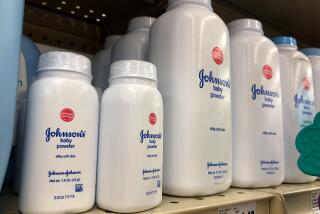Verdict for Swimmer Could Be a Test Case
- Share via
In a case that anti-doping experts say could be the first of its kind, a Santa Ana jury has awarded $578,635 to a competitive swimmer who claimed that a contaminated multivitamin caused him to test positive for steroids and be banned from his sport for two years.
Kicker Vencill, who trains in Aliso Viejo, won his lawsuit against Ultimate Nutrition, a supplement maker based in Connecticut, earlier this week.
The civil case has no bearing on Vencill’s athletic suspension, which ends later this month, but the swimmer said he felt vindicated nonetheless.
“This whole time, the finger has been pointed at me -- you’re guilty, you’re a cheater,” Vencill said Thursday. “When they read this verdict, it was like a breath of fresh air.”
Calls to Ultimate Nutrition and its attorney were not returned.
Some experts said the verdict could set a precedent in what is considered a gray area in sports -- athletes testing positive because traces of banned substances are turning up in everything from zinc tablets to protein powders.
In 2001, the International Olympic Committee financed a study that tested 634 supplements from around the world. It found that nearly 15% contained steroid precursors -- a kind of building block the body converts into steroids -- not listed on their labels. These substances, although legal, are banned in many sports.
Among products sold in stores in the United States and on the Internet, the figure was nearly 19%.
The levels detected were low, perhaps too low to enhance performance, but sufficient to trigger a positive result.
Officials say that otherwise benign supplements can be contaminated in several ways.
Supplement manufacturers, who operate largely unregulated, might unknowingly buy tainted ingredients from overseas. Or they might make a range of products, including powders or drinks that feature steroid precursors. If the vats aren’t thoroughly cleaned, residue from the previous muscle powder can taint the next batch of vitamins down the line.
“It’s obviously a widespread problem and a big concern for athletes,” said Michael Bahrke, a researcher who has written about doping in sports. “This case opens the door for a lot of cases to follow.”
Vencill tested positive for the prohibited substance 19-norandrosterone after an out-of-competition test on Jan. 21, 2003. He immediately sent his supplements to a private lab, which allegedly found that his multivitamin, a product called Super Complete, tested positive.
Even as Vencill’s case worked its way through various anti-doping panels, authorities said they believed his story. But the U.S. Anti-Doping Agency faces a dilemma in such instances because current tests cannot distinguish between a barely tainted vitamin and the tail end of a large, intentional dose taken weeks earlier.
So authorities have taken a “strict liability” stance by which athletes are responsible for everything that goes in their bodies.
Vencill filed suit against Ultimate Nutrition after all his athletic appeals had failed, saying he hoped to clear his name. His attorney, Howard Jacobs of Los Angeles, who has represented numerous athletes in doping cases, said the verdict this week could help other athletes.
“I think it’s going to be a big wakeup call to the supplement companies,” Jacobs said. “They’ve gone largely unchecked for however many years. Now they know that if they don’t clean up their manufacturing processes, they can be held accountable.”
The two-year suspension cost Vencill a trip to the 2003 Pan-American Games and a shot at the 2004 Olympics. The 26-year-old will soon resume his swimming career, racing on May 27 at the Speedo Grand Challenge in Irvine.
“I feel like I’ve been through the fires,” he said. “Now it’s time to get back in the water.”
More to Read
Go beyond the scoreboard
Get the latest on L.A.'s teams in the daily Sports Report newsletter.
You may occasionally receive promotional content from the Los Angeles Times.







